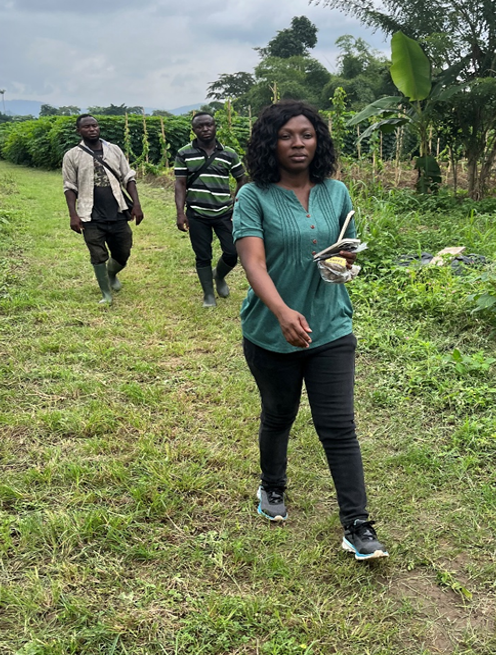
Local Leadership and Indigenous Crops: How Ghana's Traditional Foods Could Transform Food Security
by Josephine Nyame

Growing up in Ghana, I was always astounded by the fact that many indigenous fruits and vegetables went to waste – with a majority of the population not even familiar with them despite their nutritional value. This childhood observation revealed a powerful but overlooked solution to local food security. These nutritious indigenous crops, when combined with local scientific leadership, could transform West African agriculture and nutrition.

With my passion for addressing food insecurity, when I saw the call for applications for the Feed the Future Innovation Lab for Horticulture Trellis Fund Fellowship Program (TFFP), led by Florida Agricultural and Mechanical University (FAMU), I knew this opportunity was one I needed to pursue. Through my fellowship experience, I've discovered how agricultural development can effectively advance food security through respect for local leadership and knowledge systems.
Building Skills Through Meaningful Contribution
The fellowship experience was structured to maximize impact. From February to March 2024, I completed a comprehensive six-week study program covering:
- Internal and external communications
- Participatory research approaches
- Gender and inclusion in agricultural research
- Agricultural extension materials development
- Postharvest management strategies
- Survey design and implementation
During 100 hours of virtual research, I completed, cross-checked, and validated nutritional composition tables for indigenous fruits and vegetables across the West African sub-region while conducting extensive literature reviews supporting the project's key themes.
From Research to Field Impact
Working with the Horticulture Innovation Lab West Africa Regional Hub, based at the University of Ghana, I joined Hub Managers Freda E. Asem and Naalamle Amissah on their project "Promotion of Food and Nutrition Security in the West African Sub-region through Indigenous, Neglected, and Underutilized Fruits and Vegetables." The experience was transformative, blending academic learning with hands-on field exposure.

"The Trellis Fellowship program has been a wonderful and refreshing boost to our project," noted Asem. "Josephine's internship provided us with the opportunity to exchange knowledge while delving deeper into promoting the production and consumption of indigenous fruits and vegetables in West Africa. We eagerly anticipate the arrival of next year's intern!"

In the trial sites at Bunso in Ghana's Eastern Region, I witnessed resilient farming practices firsthand. The research focused on three key African indigenous leafy vegetables:
- Spider plant
- Jute mallow
- Amaranth
These field experiences demonstrated the vital role of indigenous crops in local food systems and showed how traditional knowledge enhances scientific research.
Skills Gained for Agricultural Development
Through this internship, I developed various abilities crucial for agricultural development:
- Problem-solving in real-world contexts
- Written and verbal communication
- Time management with multiple tasks and deadlines
- Working effectively under African leadership
Looking Forward
My fellowship with the Feed the Future Innovation Lab for Horticulture has deepened my commitment to nutrition security through indigenous fruits and vegetables. Working alongside African scientists has reinforced the importance of supporting locally-led agricultural research and development.
The Trellis Fund Fellowship Program demonstrates how USAID investments can strengthen local research institutions while developing the next generation of agricultural professionals. While this fellowship has concluded, the insights gained from working with the Horticulture Innovation Lab West Africa Regional Hub team will inform agricultural development approaches for years to come.
Josephine Nyame is a master's student at Tuskegee University studying Agricultural and Resource Economics, with research interests in agribusiness, supply chain management, rural development, and food policy. Her fellowship was supported by USAID through the Feed the Future Innovation Lab for Horticulture.
Want to learn more about indigenous crop research and local leadership in agricultural development? Contact the Feed the Future Innovation Lab for Horticulture to explore partnership opportunities at horticulture.ucdavis.edu/current-projects.
